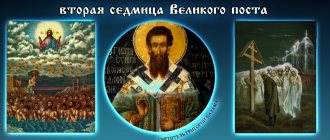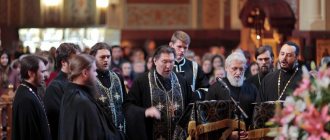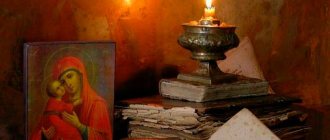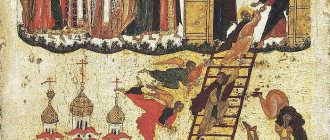Is there a communion in Lent?
Communion is a Sacrament established by Christ Himself, through which modern man comes into contact with the Lord. This is the center of the life of the Church, and therefore there is always Communion - both during Lent and on holidays.
But it must be taken into account that the days of Great Lent are a time for repentance and reflection on one’s sins, and the Liturgy is always a great joy and reward for a Christian, therefore during this period it occurs only on Saturdays and Sundays, and on weekdays it does not occur at all, or the Liturgy of the Presanctified Gifts is celebrated. There is no preparation and Translation (change) of bread and wine into the Body and Blood of Christ, but at this special service, performed only during Lent, there is Communion, since the Holy Gifts are preserved in the altar from the previous full Liturgy. Thus, the Church never deprives a believer of the opportunity to begin the Sacrament of Communion, but preparing for it is his personal task.
Communion in Lent
Try to pray and receive the Holy Mysteries three times during Lent
(at least)
: on the first week of Great Lent, on the fourth and on Holy Thursday - on Maundy Thursday
.
The Orthodox catechism of St. Philaret (Drozdov) says: “Communion is a Sacrament in which the believer, under the guise of bread and wine, partakes (partakes) of the very Body and Blood of our Lord Jesus Christ for the remission of sins and eternal life.”
The Lord tells us about the obligatory nature of communion for all who believe in Him: “Truly, truly, I say to you, unless you eat the Flesh of the Son of Man and drink His Blood, you will not have life in you. He who eats My Flesh and drinks My Blood has eternal life; and I will raise him up at the last day. For My Flesh is truly food, and My Blood is truly drink. He who eats My Flesh and drinks My Blood abides in Me, and I in him” (John 6:53-56).
The need for communion for Orthodox Christians
One who does not partake of the Holy Mysteries separates himself from the source of life - Christ, and places himself outside of Him. And vice versa, Orthodox Christians who regularly approach the Sacrament of Communion with reverence and due preparation, according to the word of the Lord, “abide in Him.” And in the sacrament, which revives and spiritualizes our soul and body, we are united with Christ Himself, like in no other Sacrament. The sacrament of communion should constantly accompany the life of an Orthodox person. After all, here on earth we must unite with God, Christ must enter our soul and heart.
A person who seeks union with God in his earthly life can hope that he will be with Him in eternity.
Miracle of Holy Communion
The Sacrament of Communion is the greatest miracle on earth, which occurs constantly. Just as the once inconceivable God came down to earth and dwelt among people, so now the entire fullness of the Divine is contained in the Holy Gifts, and we can partake of this greatest grace. After all, the Lord said: “I am with you always, even to the end of the age. Amen" (Matthew 28:20).
The Holy Gifts are a fire that burns up every sin and every defilement if a person receives communion worthily. And when we begin communion, we need to do this with reverence and trembling, realizing our weakness and unworthiness. “Although you eat (eat), O man, approach the Master’s Body with fear, so as not to be burned: for there is fire,” says the prayers for Holy Communion.
Often, spiritual people and ascetics, during the celebration of the Eucharist, experienced phenomena of heavenly fire descending on the Holy Gifts, as described, for example, in the life of St. Sergius of Radonezh: “Once, when the holy abbot Sergius was performing the Divine Liturgy, Simon (the saint’s disciple) saw how heavenly fire descended on the Holy Mysteries at the moment of their consecration, as this fire moved along the holy throne, illuminating the entire altar, it seemed to curl around the holy meal, surrounding the priestly Sergius. And when the monk wanted to partake of the Holy Mysteries, the Divine fire coiled up “like some wonderful veil” and entered inside the holy chalice. Thus, the saint of God took communion of this fire “unscorched, like a bush of old that burned unscorched...”.
Saint Basil the Great once visited a certain presbyter of a very virtuous life and saw how, during his celebration of the Liturgy, the Holy Spirit in the form of fire surrounded the priest and the holy altar.
Yes, the Sacrament of Communion - the Eucharist - is the greatest miracle and mystery, as well as the greatest mercy for us sinners, and visible evidence that the Lord established the New Covenant with people “in His blood” (see: Luke 22:20), bringing sacrificed for us on the Cross, died and rose again, resurrecting all humanity with Himself. And we can now partake of His Body and Blood for the healing of soul and body, abiding in Christ, and He will “abide in us” (see: John 6:56).
How to prepare for Communion
The Holy Mysteries - the Body and Blood of Christ - are the greatest shrine, a gift from God to us sinners and unworthy. It’s not for nothing that they are called the Holy Gifts.
In preparing for Communion, we cleanse our spiritual and physical nature. We prepare the soul through prayer, repentance and reconciliation with one’s neighbor, and the body through fasting and abstinence. This preparation is called fasting.
Prayer Rule
Those preparing for Communion read three canons:
1. Repentant to the Lord Jesus Christ;
2. Prayer service to the Most Holy Theotokos;
3. Canon to the Guardian Angel.
The Follow-up to Holy Communion is also read, which includes the canon for Communion and prayers.
It is recommended to read all the canons at a convenient time during the day before Communion, and prayers for Communion - on the day of Communion in the morning, before the Liturgy.
All these canons and prayers are contained in the Canon and the ordinary Orthodox prayer book.
On the eve of Communion, it is necessary to be at the evening service, because the church day begins in the evening.
How to approach the Holy Chalice
Before the start of Communion, those receiving communion come closer to the royal doors. This needs to be done in advance so that you don’t rush or push things later. When the royal doors open and the deacon comes out with the cup and proclaims: “Come with the fear of God and faith,” you need to bow to the ground as much as possible and fold your arms crosswise on your chest (the right hand is on top).
The priest reads aloud the prayer: “I believe, Lord, and I confess...” and the communicants repeat it to themselves.
People approach the Chalice one by one, usually babies, children and the infirm are allowed through first. Approaching the Chalice, you need to clearly state your name, received in Holy Baptism, and open your lips wide. After Communion, you should kiss the lower edge of the Holy Chalice; it symbolizes the Savior’s rib, from which blood and water flowed. The priest's hand is not kissed.
Moving away from the Chalice, without taking your hands off, you need to go to the table where they hand out pieces of prosphora and a drink (usually Cahors water diluted with warm water). After the communicant has drunk, he prays until the end of the Divine Liturgy and, together with everyone else, approaches the cross.
After Communion, you need to be especially attentive to your soul, keep yourself from empty entertainment and conversations, remain in prayer, reading spiritual books, and doing good deeds.
About Communion of children and the sick
Baptized infants, as children of the Holy Orthodox Church, are also honored with Holy Communion “for the sanctification of their souls and for the acceptance of the grace of the Lord.” Until a child is seven years old, he can receive communion without confession or fasting. From the age of three to four, infants are usually given communion on an empty stomach. From about the age of three, children together with their parents on the eve of Communion can read two or three prayers known to them.
You should come to church with babies not for Communion itself, but in advance, calculating the time so as not to be late for Communion, but at the same time so that the child can attend the Liturgy to the best of his ability and age. Of course, everyone has their own measure here, but children must be taught to pray in the Church. This should be done gradually so as not to tire the baby and not cause disturbance to those praying in the temple. Children 6–7 years old, if they have been properly accustomed to the service, can be present at almost the entire Liturgy.
You can often observe how already quite large babies behave very restlessly at the Chalice, cry, scream, and struggle. As a rule, this is due to the fact that these children are rarely given communion. Parents need to set up and reassure the child in advance; they can show him how other children calmly receive communion. And, of course, give your child communion more often.
When approaching the Holy Chalice, infants should be held horizontally, with their head on their right hand. The handles should be held so that the child does not accidentally push the Bowl or grab the spoon.
Parents, when giving communion to their children, should also try to begin the Holy Mysteries, thereby setting an example for their children. A family is a small Church where people go to God together, are saved together and partake of the same Chalice.
Young children are usually given communion under one form (only the blood of Christ). But if the baby receives communion often and behaves calmly at the Chalice, the priest can give the child (not the infant) a small particle.
Communion of the weak and sick at home
There are times when people, due to illness, infirmity and old age, cannot come to church themselves, confess and receive communion. Then a priest is invited to their home for Communion. The Sacrament of Communion at home is also performed on dying Orthodox Christians.
The Holy Sacraments are performed only on a conscious person. Parting words cannot be left until the last minute. If a person is seriously ill, you should immediately call a priest to see him.
Communion at home is performed with spare Holy Gifts. They are prepared once a year, on Maundy Thursday during Holy Week, and are stored in a special tabernacle, which stands on the holy altar in the altar.
Communion at home is performed according to the rite “Whenever soon a sick person is given communion.” This is a small sequence during which the priest reads prayers for the healing of the sick person and the forgiveness of his sins.
It is necessary to consult with a priest about how to prepare a particular patient for Communion. The sick also receive communion at home on an empty stomach (only those who are dying can receive communion without an empty stomach).
To invite a priest to visit a sick person at home, you need to come to the temple in advance and personally state your request to the priest. Agree with the priest about the time and day of the visit, and also leave your address and telephone number.
Before visiting the priest, in the room where the patient is, you need to prepare a table (there should be no foreign objects on it), cover it with a clean tablecloth or napkin, and place an icon. Warm boiled water, a cup and a teaspoon are also prepared.
After communion, the sick person should be given a piece of prosphora or antidor and warm water. If the sick person cannot read the prayers of thanksgiving for Holy Communion himself, you need to read them aloud to him.
We partake of the Holy Mysteries of Christ for the healing of soul and body, and in times of illness and infirmity, Communion is especially necessary for Orthodox Christians. Many examples can be given when, after Confession, Unction and Communion, seriously ill people, whom relatives already considered dying, rose from their sickbeds.
Hieromonk Job (Gumerov)
www.pravoslavie.ru
***
Before Communion
Before the doors of Your temple, Your holy abode, Ashamed of my shame, I stand with a confused soul.
Pictures of terrible sins arise in my imagination... I can’t... I’m not ready, I’m not worthy of healing!
I look around, the people are kneeling in tears, crossing themselves, silently shedding tears, and praying with humble souls.
This wedding feast is not for me, I am not called to the Royal Palace, the noisy world is calling me, I prayed to another God.
I submissively served my passions, suppressing my good aspirations, and drowning out the noise of the world, the reproaches of my conscience and torment.
Yes, I'll leave!.. Why stand? In the struggle and fear and doubt, to boldly insult the Shrine, and to bring judgment for impudence.
Repent and sin again, And again pray for forgiveness, In sin, in passions, In self-forgetfulness?!
I’ll leave!.. Who will I pester then, And who will understand my suffering? Who can raise the fallen, strengthen the good desires?
Who will ease the sorrows of the heart? Who will direct my mind to the truth? Will it strengthen the will for good, and deliver the soul from passions?
Who will give joy to my soul? Who will give her undisturbed peace? Who will protect you from the temptations of this life with an invisible hand?
No, I’ll stay!.. Only here I’ll find peace for myself! Yes, only in the Cup of Life is there healing for spiritual wounds!
You are Life, You are Truth, You are the Way, Christ! We begin to cling to You with mortal lips, To the Immortal Chalice we dare.
We are not worthy of Your blessings: Our morals are criminal, deceitful, But have mercy on Your servants, Do not destroy us, O righteous God!
Do not remember before Your Judgment your sins and insane deeds! The existence of insignificant souls was not hit by His fire.
The curtain rose... more tears! More humility, people are brothers! The doors are open... here is Christ! Calls us all into His arms!
A. Klyucharev
Communion during fasting days
Ancient Christians took communion very often, because they could not imagine their lives apart from Christ. But over time, traditions have changed, so now you can find opinions that you need to take communion only a few times a year on major holidays or during fasting. Christians usually decide for themselves how often they should receive communion, after consulting with a priest. But during the days of fasting, when believers try to fight their sins, look inward, repent and pray, Communion is a necessary spiritual medicine. In addition, during Holy Week, most believers try to take communion on Maundy Thursday - the day when the Church remembers the very establishment of this Sacrament by Christ.
What is the Sacrament of Communion?
What is Communion? Communion is God's gift to people. The essence of the gift is the opportunity to be closer to Christ, to be with him as a friend in the closest relationship. The custom of eating prosphora with wine as a way of connecting with God is very ancient. Christ introduced the sacrament of communion on Maundy Thursday, the day before the crucifixion, 3 days before the Resurrection.
He established this sacrament at the Last Supper, that is, during the last dinner with the disciples. At that dinner he blessed the cup, bread and wine. At Communion they receive a piece of God - prosphora and wine, symbolizing the Body and Blood of the Lord himself. A custom has developed to let children go to the Chalice first, then men come up, and then women. They do not cross themselves near the chalice, so as not to accidentally touch it and knock it over.
Communion is a gift of God
What is important in the sacrament of Communion is the connection with God. By partaking of the Body and Blood of our Savior from a single Chalice, we thereby unite with each other. Prayer in the temple is an occasion to show a sign of your friendliness towards the friends of Christ. What Communion in church is can only be understood by attending it.
Now most people are baptized, but not enlightened, that is, they do not have basic knowledge about the faith, and especially about the Church Sacraments. But when a person does not participate in the sacraments of the Church, it is very difficult for him to resist those temptations and temptations into which his earthly turmoil constantly leads him. The human soul desires spiritual communication, but sometimes it is looking for it in the wrong place; it is looking for paradise, but is often mistaken in its search.
Communion during Lent: on what days is it possible?
Communion during Lent is possible on any day when there is Liturgy in the church.
During the days of Great Lent, the liturgical charter does not provide for it every day, but only on Wednesday, Friday, Saturday, Sunday and significant holidays (the day of remembrance of the Forty Martyrs of Sebaste - March 22, the Annunciation - April 7, etc.). The Liturgy on Lenten weekdays is very different from the usual service - it is the Liturgy of the Presanctified Gifts, but, of course, you can also receive communion at it. Moreover, many believers try to attend this special service at least once a year.
During fasting, as in the days of preparation for communion, a Christian abstains from light food, prays more, tries not to sin and to reconcile with those with whom he is in a quarrel. Accordingly, if no events have occurred that contradict the approach to the Sacrament, having read the prescribed prayers the day before and confessed, believers can receive communion at any Liturgy during the days of fasting.
Preparation for Communion in Lent
Preparing for Communion during Lent is no different from preparing for the Sacrament at any other time. It is necessary to observe abstinence (in food, marital relations, entertainment), read the prescribed prayer rule the day before, prepare for confession and repent. It is highly advisable to attend the evening service. As always, immediately before communion, a Eucharistic fast is needed: if the service is in the morning, then food and drink are refused from 12 o’clock at night, if in the evening (according to ancient tradition, in some churches the Liturgy of the Presanctified Gifts during Great Lent is served in the afternoon) - complete abstinence must be at least 6 hours.
But giving up meat and all kinds of delicacies is not a guarantee of readiness for communion. During the period of fasting, as at any other time, we may have conflicts with people around us, quarrels and misunderstandings. But you cannot approach the Sacrament with malice and anger in your heart. On days of fasting, you need to be especially attentive to what is happening in your soul, and you need to go to the Chalice only after cleansing your soul with personal repentance and forgiveness of offenses.









